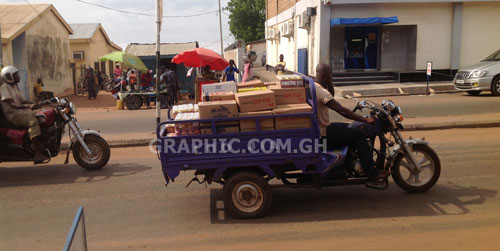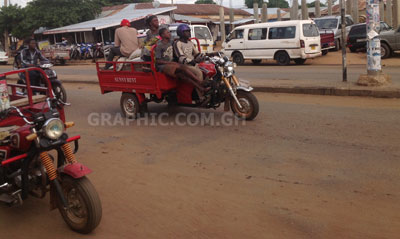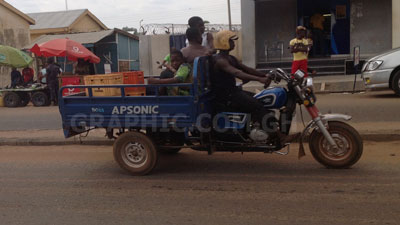Motor-King Tricycle, a blessing or curse?
 The introduction of the Motorking tricycle in the Upper West Region was seen as a blessing for rural farmers. It was a blessing because the drudgery associated with farmers travelling long distances to market their produce was going to be a thing of the past.
The introduction of the Motorking tricycle in the Upper West Region was seen as a blessing for rural farmers. It was a blessing because the drudgery associated with farmers travelling long distances to market their produce was going to be a thing of the past.
Advertisement
This is because most roads linking a large number of communities in the region are very deplorable, thereby making travelling on them very unpleasant.
Farmers in the region, indeed, took advantage of those tricycles, which also go by the name “Nyaaba lorry”, which means the “disgraceful car” in the local Wala language, to cart their goods to various market centres to sell.
In fact, the tricycles became so popular because of the services they rendered that serious rivalry ensued between truck pushers and the riders of these motorbikes. In some instances, the situation almost led to a serious breach of peace when the former accused the latter of trying to put them out of business.
Taxi drivers equally felt unsafe with the operations of the tricycles, since the tricycles charged lower fares, for which reason people who had to cart goods and food items from one point to another preferred them to taxis and trotros.
Indeed, every Tom, Dick and Harry who felt like carting goods to a destination relied on the tricycles. Worrying developments
Worrying developments
In no time, however, the tricycles which were designed to carry only goods now carry more passengers than goods, with the police looking on unconcerned, although the tricycles pass through various checkpoints.
“We are forced to pick people because they find it very difficult getting vehicles to the urban centres and we think the police understand our situation,” a tricycle rider told this reporter at the Wa — Kajetia Lorry Station.
Such is the situation, and currently the tricycle which was initially hailed as having come in handy seems to be a curse in the Upper West Region, particularly the Wa municipality.
Not a day passes without a “Nyaaba Lorry” getting involved in an accident, denting stationary vehicles or killing pedestrians.
In the first quarter of this year, 22 people perished from accidents involving the tricycles, according to officials of the National Road Safety Commission (NRSC).
The month of April also recorded six deaths.
Currently, the tricycles outnumber the population of cars in Wa. The situation is attributed to the corruption which characterised the 2012 elections, during which politicians doled out tricycles to entice the electorate to vote for them.
Riders speed and compete with cars and heavy-duty vehicles on the main roads, without recourse to road traffic regulations. Just recently, a friend of this reporter working with the Metro Mass
Transit lost his life due to the carelessness of a rider.
Recently, two schoolchildren, who had been picked from school, were crashed by a speeding rider, killing one of them in the process. The other kid is still recuperating from the injuries sustained.
According to Mr Emmanuel Klugah of the Driver and Vehicle Licensing Authority (DVLA), the issue of Nyaaba Lorry has become a major concern in the region.
He said his outfit had registered a number of tricycles in the region and blamed the high rate of accidents involving them on inexperienced riders.
He said most of the riders were school drop-outs and people who wanted to experiment with the tricycles or those competing for goods.
But a leader of one of the riders’ associations, Abu Munkaila, blamed the high rate of accidents on the owners of the tricycles, who forced riders to make high daily sales.
“We don’t have a fixed amount as daily sales. The owners, most of the time, give us different targets depending on the circumstances and we have no option but to abide by them. At times I am told to make sales of GH¢30 or GH¢40 and because we are many in the system, it has to be survival of the fittest,” he told the Daily Graphic in Wa.
He admitted that most of the riders were illiterates who did not understand road signs but saw the Nyaaba Lorries as normal motorbikes which could meander through narrow passages.
The NRSC in the Upper West Region, having realised the high rate of deaths involving Nyaaba Lorries, has been organising educational campaigns to arrest the situation, but it seems its efforts are not enough due to some factors.
Mr Mohammed Samad, the Upper West Regional Manager of the NRSC, described the situation as both a blessing and a curse.
“It is mixed because the objective was to transport goods and travellers, which normally are not in large quantities. That tricycles has reduced the burden on farmers and travellers because the tricycles can distribute goods in bits, unlike trucks. Looked at that way, it is a blessing, since their advent has improved the situation.
“However, looking at their mode of operation, the tricycles, by law, are to carry goods only and not passengers and that is what is worrying. it is the expectation that the necessary agencies will bring them to order,” he said.
Mr Samad confirmed that majority of the operators were minors and school drop-outs who rode without licences, registered numbers, crash helmets and, worse of all, did not know any traffic rules or regulations, “and the result is what we see every day”.
“These riders always pass in front of the police charge office, yet nobody seems to care. Until we take a tough stand, these people will continue to violate the law with impunity,” he said. The way forward
The way forward
Majority of the tricycles do not have reflectors and so in the night other road users presume that they are ordinary motorbikes. When pedestrians do not see the buckets that trail the tricycles, they easily get killed by the tricycles.
Most of the riders do not wear crash helmets, while majority of the tricycles belong to very influential personalities in the region, hence they are able to get their way around when their riders fall foul of the law.
According to Mr Samad, the law enforcement agencies could do better in the Upper West Region in general and Wa in particular by insisting on the right things.
“The law should not be bent to favour offending operators. The law must be made to work, while people in high office should not interfere with the work of the police. They should be made to work without fear or favour,” he pointed out.
According to him, the enforcement of the law was key to solving the current situation.
A road user, Mr John Coffie, called for a bye-law to ban the movement of the tricycles after 7 p.m. because of the way their riders operated and sped at night.



